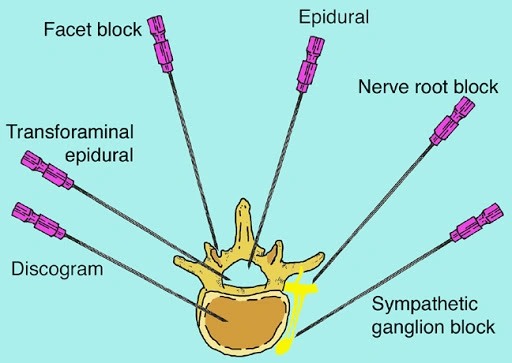Epidural Nerve Block
Epidural is an injection that goes into the epidural space, which is just outside of the membrane which protects the spinal cord. Epidural injections are given to ease pain during and after surgery, and also manage chronic pain.
This practice isn’t suitable for every case. But if it’s required, it should be a lower dose of medicine which results in fewer side effects. Epidurals can give you longer-lasting pain release and help you stay more alert and mobile.
An epidural nerve block is one of the most common uses of an epidural. It’s a kind of anesthesia that your doctor can give you during operation to numb your spinal nerves and stop pain signals from reaching to your brain. It typically starts to work in only 10 to 20 minutes.

You will get a nerve block by a little, flexible tube, known as a catheter, which goes near your spine at the small of your back and provides the medicine nonstop; therefore you don’t feel any pain during the surgery.
The epidural aims the nerves which carry pain signals. Therefore you’re still able to sense touch and pressure. Actually, even though you won’t feel any pain in the lower portion of your body, you can still be able to walk around with a little help. Due to these reasons, doctors generally suggest the use of an epidural nerve block when a woman decides to get anesthesia during childbirth.
Some epidural injections are prepared with different medicines, which may include steroids, to lessen pain and inflammation in the back, neck, arms, or legs.
The doctor uses an X-ray with a special dye to insert the needle in the exact spot. She/he will select a place along your spine from the bottom of your neck to your tailbone which is nearest to the nerve causing your pain.
Problems that may be treated by an epidural injection include:
- Pinched Nerve
- Herniated disc
- Spinal stenosis
Side Effects
Side effects may include:
- A fall in blood pressure
- Difficulty urinating
- Headache
Rare complications may include:
- Bleeding in the epidural space
- Infection
- Nerve damage



